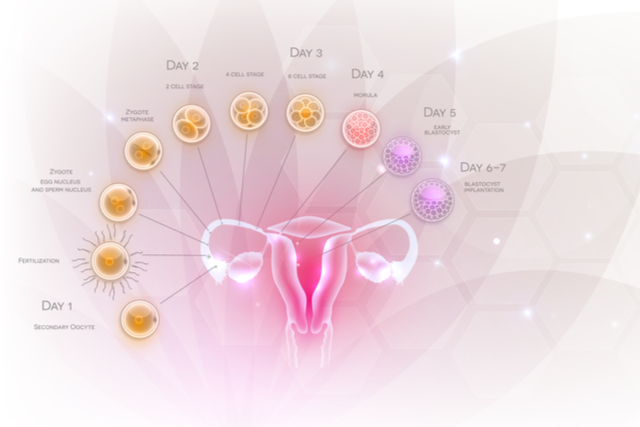Angiogenesis is the growth of new capillary blood vessels in the body. The body controls angiogenesis by producing a precise balance of growth and inhibitory factors in healthy tissues. When this balance is disturbed, the result is either too much or too little angiogenesis. Angiogenic diseases result from new blood vessels growing either excessively (e.g. cancer, diabetic retinopathy and psoriasis) or insufficiently (e.g. chronic wounds and ischaemic heart disease). In many serious diseases states, the body loses control of angiogenesis.
Female reproductive system and angiogenesis
In adults, physiological angiogenesis is normally associated only with tissue growth or repair and most adult tissues are relatively stable. In contrast, the tissues of the adult female reproductive system, including the ovary, uterus, and placenta, grow extremely rapidly and at regular intervals. In association with their high vascularity, tissues of the female reproductive organs also receive some of the greatest rates of blood flow, per unit of tissue, of any adult organ and exhibit a high metabolic rate.
The angiogenic process in the ovaries
The adult ovary exhibits a dramatic growth and regression of capillary networks on a cyclic basis accompanied by equally striking changes in their rates of blood flow. Ovarian function is dependent on the establishment and continual remodelling of a complex vascular system. The high degree of vascularity of the ovarian tissues leads to the conclusion that angiogenesis is a critical component of the follicular and luteal functions of the ovary. Regulation of the process of angiogenesis determines the hormonal regulation as well as metabolic cellular signals such as intracellular oxygen content and ageing.
Angiogenesis and development of follicles
Recent work has supported the concept that maintenance of the follicular vasculature is important for maintaining follicular health. Ovarian follicles and corpora lutea have been shown to contain and produce angiogenic factors. These angiogenic factors appear to belong to the fibroblast growth factor (FGF) and vascular endothelial growth factor (VEGF) families of proteins.
The ovarian vasculature is not distributed equally among the plethora of non-growing and growing follicles and development of the follicular microvasculature may be of primary importance to further follicle growth. Angiogenesis can be a marker for the selection of the dominant follicle. The selection of the dominant follicle is said to correlate with the formation of a richer vasculature structure which exposes it to higher gonadotropins levels when compared to other subordinate follicles.
The corpus luteum and angiogenesis
The corpus luteum is one of the most angiogenic tissues known. The ovarian corpus luteum plays a critical role in reproduction because it is the primary source of circulating progesterone. After ovulation, as the corpus luteum forms from the wall of the ruptured follicle, it grows and vascularises extremely rapidly. In fact, the rates of tissue growth and angiogenesis in the corpus luteum rival those of even the fastest-growing tumours. Vascular endothelial growth factors (VEGF) seem to be major angiogenic factors responsible for vascularisation of the developing corpus luteum.
The placenta and angiogenesis
It has been suggested that insufficient vascularisation of the placenta is a major contributor to embryonic death during early pregnancy, and indeed reduced placental vascular development and increased vascular resistance have been associated with early embryonic mortality.
Additionally, it has been shown that the large increase in transplacental exchange of nutrients, respiratory gases, and wastes that occurs during the last half of gestation, and which supports the exponential increase in foetal growth, depends primarily on the dramatic growth of the placental vascular beds and the resultant large increases in uterine and umbilical blood flows. Factors that influence placental vascular development have a dramatic impact on foetal growth and development and subsequent neonatal survival and growth.
Ageing and angiogenesis
Although the effects of ageing on vascular dynamics in the ovary have yet to be elucidated, it is possible that diminished angiogenesis during folliculogenesis could be a factor in oocyte abnormalities, and hence reduced fertility in women of advanced reproductive age. Friedman et al measured VEGF concentrations in women of advanced reproductive age undergoing in vitro fertilization (IVF) programmes and determined that there was an age-related increase in follicular fluid VEGF levels. The increase in VEGF was suggested to be consistent with the hypoxic environment within follicles of older women.
Supporting angiogenesis in fertility care
When addressing issues of infertility, angiogenesis is the key factor that has to be considered. It determines and regulates the development of the pre-ovulatory follicles, the developing corpus luteum and the formation of receptive endometrium. There are many reproductive disorders that are rooted in the pathology of angiogenesis.
Treating various diseases by regulating angiogenesis utilizing certain pro-angiogenic and anti-angiogenic plant components has thousands of years of accumulated clinical experiences in Eastern medicine. The unparalleled effects of the specific herbal formulations on fertility care can be partially attributed to bringing about the regulation of angiogenesis in the reproductive system.
Identifying the problem and supporting and regulating angiogenesis using specific herbal medicine is one of the important parts of the work at Pathways clinic and differentiates us and our results. This methodology enables us to successfully treat those clients with advanced maternal age who respond poorly to hormonal stimuli. We have also learned from our accumulated clinical experiences that angiogenic support is essential for those going through a menopausal transition with fluctuating hormone levels, uterine hypoxia and difficulty in maintaining pregnancy.
Dr. Ryu’s articles
Angiogenesis: Can you make new blood vessels?
Improving Endometrial Receptivity for IVF success
Endometrial receptivity and implantation





